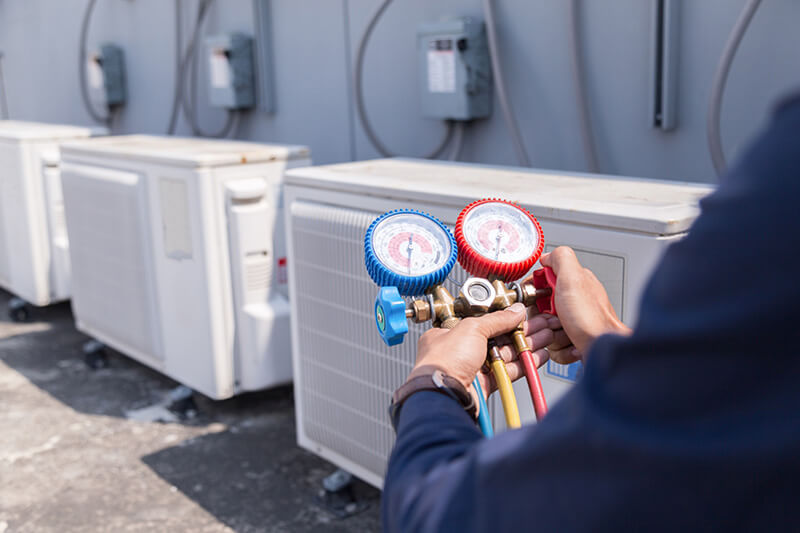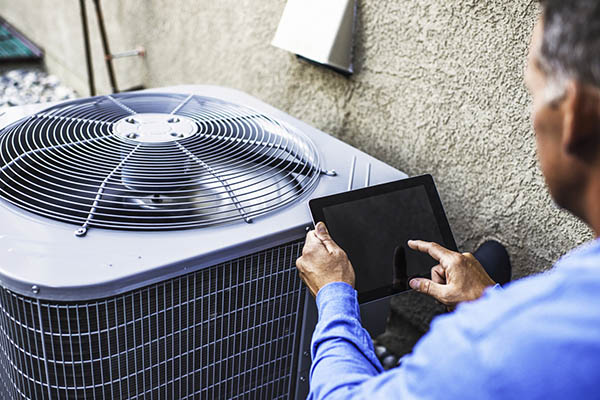The Best Ways to Improve Indoor Air Quality with ductless mini splits
The Best Ways to Improve Indoor Air Quality with ductless mini splits
Blog Article
Choosing In Between a Warm Pump and Heater: Key Considerations for Your Cooling And Heating Requirements
When evaluating home heating options for a/c needs, the choice between a heatpump and a furnace can be complicated. Each system uses unique advantages tailored to specific climates and power effectiveness goals. Understanding these distinctions is essential for making an educated choice. Secret elements such as installment costs and environmental effect even more make complex the option process. Which option absolutely straightens with one's comfort and sustainability choices? The following areas will check out these considerations carefully.
Comprehending Heat Pumps: Just How They Function and Their Benefits
While many property owners consider numerous heating alternatives, recognizing just how warm pumps feature and their advantages can significantly influence their choice. Warm pumps run by transferring warmth instead of producing it. In the winter months, they remove heat from the outdoors air or ground and move it indoors, while in the summer, they reverse this process, cooling down the home by expelling heat outside. This twin capability makes them flexible for year-round climate control.One of the main benefits of heatpump is their power efficiency. They make use of significantly much less power contrasted to typical home heating systems, possibly causing reduced energy bills (furnace replacement). In addition, heat pumps have a smaller sized carbon footprint, making them an ecologically friendly option. They additionally need less upkeep than standard systems, adding to lasting price financial savings. Overall, understanding the auto mechanics and advantages of heatpump can assist house owners make informed choices concerning their heating and cooling down requirements
Checking Out Heaters: Kinds, Procedure, and Advantages
Heaters can be found in numerous kinds, including gas, electrical, and oil models, each with unique operational devices. Understanding these differences is essential, as they influence effectiveness and home heating efficiency. Furthermore, heaters provide numerous advantages, such as consistent warm outcome and dependability in colder climates.
Sorts of Heating systems
Home heating systems can differ significantly in style and operation, with heating systems being a prominent option amongst homeowners. There are numerous kinds of heaters, each using different fuel sources and modern technologies. Gas heating systems prevail, leveraging gas to create warm efficiently. Electric furnaces, on the various other hand, use electric resistance to produce heat, usually favored for their uncomplicated setup. Oil furnaces, while less typical, work in locations with minimal gas gain access to (heat pump installation ooltewah tn). In addition, condensing furnaces optimize power performance by recycling and catching exhaust gases. Each kind runs through a system of warm exchangers and ductwork to disperse warm air throughout a home. Comprehending the distinctions in between these heater kinds is important for notified heating and cooling choices
Benefits of Heating systems
For property owners seeking reliable heat throughout cold months, the advantages of heating systems are significant. Furnaces supply constant home heating, making sure even temperature levels throughout the home. They are particularly efficient in severe cold, commonly outmatching heatpump in cold conditions. Different kinds, including gas, electric, and oil furnaces, provide versatility to meet varied requirements and preferences.Furnaces likewise often tend to have lower first setup expenses compared to heatpump, making them an extra easily accessible option for numerous. Their durable style adds to a longer life expectancy, with several devices lasting over 15 years with proper upkeep. Additionally, modern-day heaters are often furnished with advanced modern technology for improved efficiency, which can cause lowered energy bills. On the whole, furnaces continue to be a reputable selection for reliable home heating.

Energy Effectiveness: Contrasting Warmth Pumps and Furnaces
When comparing power performance in between heatpump and heaters, the Seasonal Energy Effectiveness Proportion (SEER) plays an essential role in identifying performance. Furthermore, a functional expense evaluation reveals the lasting financial effects of each system. Understanding these aspects can assist homeowners in making informed choices regarding their heating solutions.
Seasonal Power Efficiency Ratio
Energy efficiency plays an important role in the decision-making process between heatpump and heating systems, particularly when thinking about the Seasonal Power Efficiency Proportion (SEER) This statistics steps the cooling efficiency of heatpump over a whole cooling season, offering a standardized way to examine performance. Higher SEER rankings show greater power effectiveness, equating to lower energy usage and lowered energy bills. In contrast, furnaces are usually analyzed utilizing the Yearly Fuel Utilization Effectiveness (AFUE) ranking, which reflects heating efficiency. When comparing these two systems, homeowners should prioritize SEER ratings for warmth pumps, as they directly influence general energy cost savings and ecological sustainability. A complete understanding of SEER can significantly see here influence the long-lasting complete satisfaction and cost-effectiveness of the selected heating and cooling service.
Operational Expense Evaluation
Comprehending the operational costs linked with heatpump and heaters is crucial for homeowners evaluating their choices. Heatpump commonly supply greater power performance, converting electrical power into warm with very little waste. This results in reduced monthly energy bills, specifically in moderate environments. On the other hand, standard heaters, especially gas designs, might have reduced in advance prices however can incur greater operational expenses with time as a result of fuel rates and effectiveness ratings.Moreover, heat pumps can work as both home heating and cooling down systems, potentially minimizing the requirement for separate cooling and heating systems. While first investments for heatpump might be greater, their lasting cost savings in power effectiveness can make them a more affordable selection for lots of households. Mindful analysis of regional power prices is vital to figure out the very best choice.
Installation Prices: What to Expect for every Heater
Setup prices for furnace can differ considerably between heatpump and heaters, affecting house owners' choices. Warm pumps usually have greater in advance setup expenses, normally varying from $3,500 to $8,000, depending upon the system size and complexity of installment. This consists of the outside system, indoor handling system, and necessary ductwork i thought about this adjustments. Conversely, heating systems tend to have reduced initial expenses, balancing between $2,500 and $6,000, which can be appealing for budget-conscious property owners. Installation expenses can increase if comprehensive ductwork is required.Moreover, the selection of gas type for furnaces-- all-natural gas, lp, or electrical-- can likewise impact installment expenses. While heatpump supply power efficiency, their initial financial investment may discourage some customers. Eventually, reviewing installation costs along with long-lasting cost savings and performance will certainly help homeowners in making notified choices regarding their heater.
Environment Factors To Consider: Which System Executes Better in Your Location
Just how do climate conditions influence the efficiency of heating unit? The efficiency of heatpump and heaters can differ significantly depending upon the local climate. In modest climates, heat pumps stand out by effectively transferring warm from the outside air, making them an energy-saving option. Their performance lessens in extremely cool temperature levels, where they might struggle to remove sufficient warmth. Conversely, furnaces, particularly gas designs, supply constant and reliable warmth no matter outside problems, making them more suitable in colder regions.In areas that experience milder winter seasons, heatpump can run efficiently year-round, supplying both cooling and heating. In comparison, regions with severe winter seasons commonly take advantage of the robustness of furnaces. Eventually, comprehending the neighborhood environment is essential when deciding in between a warm pump and a furnace, as it directly influences their functional efficiency and overall efficiency.
Maintenance Requirements: Long-Term Care for Heat Pumps vs. Furnaces
While both heatpump and furnaces call for routine maintenance to ensure peak performance, their details demands and treatment regimens vary substantially. Heaters normally require less regular focus, with annual evaluations being enough to examine for gas leaks, clean filters, and analyze general capability. Their simpler style commonly permits simple repairs.In contrast, warmth pumps demand biannual upkeep because of their dual function in cooling and heating. This consists of cleansing coils, checking cooling agent levels, and making sure that both the outside and indoor devices work at their ideal. Additionally, heatpump upkeep often involves even more complex components, making expert servicing essential.Neglecting upkeep can result in lessened efficiency and increased power prices for both systems. Eventually, property owners need to think about these long-term treatment demands when choosing between a warmth pump and a heater, as positive upkeep can prolong the lifespan and efficiency of either system significantly.
Environmental Impact: Picking a Lasting Heating Option
The ecological effect of heating unit is a vital analysis for homeowners looking for sustainable options. Warm pumps are typically much more energy-efficient than standard furnaces, as they move heat as opposed to create it, greatly decreasing carbon emissions. By utilizing renewable resource resources, such as air-source or geothermal heatpump, home owners can even more minimize their eco-friendly footprint.On the various other hand, all-natural gas heaters discharge greenhouse gases and contribute to air contamination, though they usually give greater warmth outcome. Improvements in innovation have led to the growth of high-efficiency heating systems that decrease emissions.Ultimately, choosing a heating system includes weighing efficiency against ecological impact. Property owners are urged to assess local energy resources and incentives for renewable systems, guaranteeing blog here a selection that lines up with both individual comfort and ecological duty. The choice affects not only immediate comfort but likewise lasting sustainability and environmental health and wellness.
Often Asked Questions
Exactly How Long Do Warm Pumps and Furnaces Typically Last?
The lifespan of heatpump typically varies from 15 to two decades, while heaters can last between 15 to 30 years. Routine upkeep substantially influences their longevity and performance in offering home heating services.
Can I Utilize a Warmth Pump in Very Cold Climates?
Heatpump can operate in extremely cool environments, but their efficiency lessens as temperature levels decrease. In such conditions, additional home heating sources may be essential to preserve comfortable indoor temperature levels and ensure peak performance.

What Is the Sound Level of Warm Pumps Versus Furnaces?
The sound levels of heatpump and heaters vary significantly. Typically, warmth pumps run even more quietly than conventional heating systems, making them more effective for those sensitive to sound, while heating systems may create louder operational sounds throughout heating cycles.
Are Warmth Pumps Suitable for Both Heating & Cooling?
Heatpump are indeed suitable for both home heating and air conditioning (furnace replacement). They operate by moving warm, giving effective temperature level control year-round, making them a flexible choice for house owners looking for an all-in-one heating and cooling option
What Dimension Furnace Do I Required for My Home?
Determining the proper size home heating system for a home calls for reviewing aspects such as square footage, insulation high quality, regional environment, and the home's layout. Consulting a professional can guarantee an exact analysis and ideal comfort. Warm pumps generally offer greater energy efficiency, converting electrical energy into heat with marginal waste. In modest climates, heat pumps stand out by efficiently moving warm from the outdoors air, making them an energy-saving alternative. Alternatively, heaters, particularly gas versions, provide trusted and consistent heat no matter of outside problems, making them better in colder regions.In areas that experience milder winter seasons, warm pumps can operate successfully year-round, providing both heating and cooling. Heat pumps are normally a lot more energy-efficient than conventional heating systems, as they transfer heat rather than generate it, considerably lowering carbon discharges. By using sustainable energy resources, such as geothermal or air-source warm pumps, home owners can better reduce their ecological footprint.On the various other hand, all-natural gas furnaces send out greenhouse gases and contribute to air contamination, though they commonly supply higher warm outcome.
Report this page